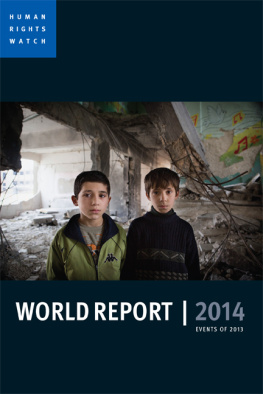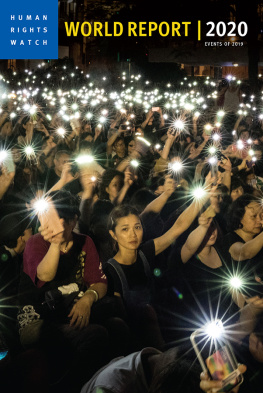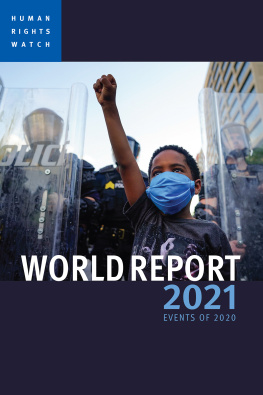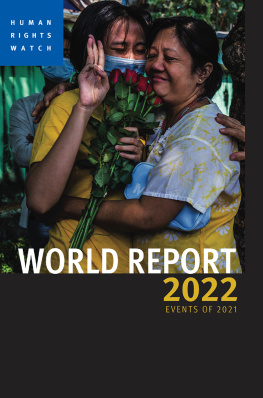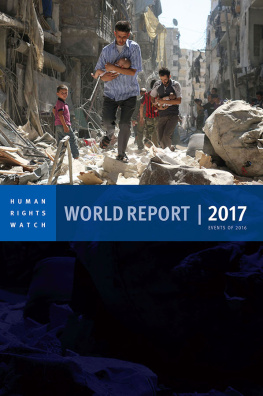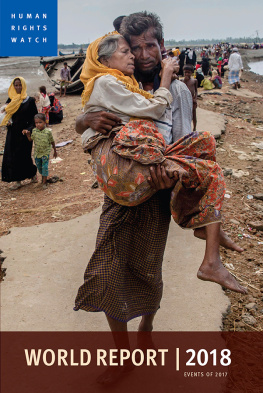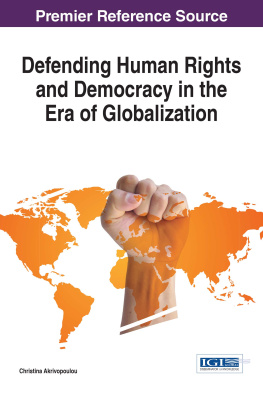
Foreword
World Report 2014 is Human Rights Watchs 24th annual review of human rights practices around the globe. It summarizes key human rights issues in more than 90 countries and territories worldwide, drawing on events from the end of 2012 through November 2013.
The book is divided into three main parts: an essay section, photo essays, and country-specific chapters.
Reflecting on the Rights Struggles of 2013, Executive Director Kenneth Roth highlights three main themes. In Syria, the slaughter of civilians continued with only a weak international response, straining the Responsibility to Protect, or R2P, doctrine, which commits world governments to respond to imminent or ongoing mass atrocities. Elsewhere, governments are engaged in what Roth calls abusive majoritarianismexpressing outward commitment to democracy while in reality using the real or perceived preferences of the majority to limit dissent and suppress minorities. And in the United States, new disclosures about the use of dragnet surveillance and targeted drone killings have fueled debate about the tactics of counterterrorism. But Roth sees encouraging signs. The R2P doctrine appears to be holding up enough to provide at least some help in several African countries facing mass atrocities, including the Central African Republic, South Sudan, and the Democratic Republic of Congo; public reaction has been strong against what Roth calls feigned democracy; and the US government faces increased pressure to change current counterterrorism practices. In addition, he notes improvements in the machinery that helps to defend human rights, including the United Nations Human Rights Council. The year 2013, he concludes, may have had more than enough suffering, but it also featured a vigorous movement fighting back.
Next, Maria McFarland Snchez-Moreno charts Human Rights Watchs evolving approach to current global policies aimed at curbing drug use and the multi-billion dollar illegal drug trade (The Human Rights Case for Drug Reform). For many years, Human Rights Watch documented widespread abuses that governments committed in the name of combatting drugs. But research in several countries led us to the increasing conviction that, when it came to personal use and possession of drugs, the criminalization of drugs was not only ineffective and corrosive of institutions, but also inconsistent with personal autonomy and the right to privacy. In 2013, Human Rights Watch adopted a policy calling on governments to decriminalize all personal use and possession of drugs, and to adopt alternative policies on the drug tradea new course that McFarland argues is vital to avoiding the crippling human costs of the current approach to drug control.
More than a decade ago, world governments established eight Millennium Development Goals (MDGs)including commitments to reduce child and maternal mortality and achieve universal primary educationall to be achieved by 2015. In Putting Development to Rights, David Mepham argues that despite real progress in some areas, the neglect of human rights in the MDGs has diminished and distorted development efforts, with many people excluded or unable to benefit from development programs. More worrying still, many people have been harmed by economic policies carried out in the name of development. Mepham suggests that the current UN-led process to establish successor goals to the MDGs provides a crucial opportunity to broaden our understanding of development and fully integrate human rights into development policy and practice. Doing so, he says, will help promote more just and inclusive development, and improve the lives of millions of the worlds poorest and most marginalized people.
After 2013s flood of revelations about pervasive US online surveillance, Dinah PoKempner pushes back against those who argue that we must simply live with it because public expectations of privacy have eroded (The Right Whose Time Has Come (Again)). Privacy, she says, is a crucial gateway to almost every other right, and nothing less than the shelter in which we work out what we think and who we are. Putting the vulnerability that many people feel as lives migrate online into historical and legal perspective, she describes legal efforts from the end of the nineteenth century to address technological developments seen as menacing peoples private lives. Once again, she says, technology is evolving and the law must catch up.
The photo essays that follow highlight three underreported human rights crises: child marriage in South Sudan, the impact of the 2014 Sochi Olympics on human rights in Russia, and the growing human rights and humanitarian tragedy in the Central African Republic.
The rest of the volume consists of individual country entries, each of which identifies significant human rights issues, examines the freedom of local human rights defenders to conduct their work, and surveys the response of key international actors, such as the UN, the European Union, the US, and various regional and international organizations and institutions.
The report reflects extensive investigative work that Human Rights Watch staff undertook in 2013, usually in close partnership with human rights activists in the country in question. It also reflects the work of our advocacy team, which monitors policy developments and strives to persuade governments and international institutions to curb abuses and promote human rights. Human Rights Watch publications, issued throughout the year, contain more detailed accounts of many of the issues addressed in the brief summaries in this volume. They can be found on the Human Rights Watch website, www.hrw.org.
As in past years, this report does not include a chapter on every country where Human Rights Watch works, nor does it discuss every issue of importance. The absence of a particular country or issue often simply reflects staffing limitations and should not be taken as commentary on the significance of the problem. There are many serious human rights violations that Human Rights Watch simply lacks the capacity to address.
The factors we considered in determining the focus of our work in 2013 (and hence the content of this volume) include the number of people affected and the severity of abuse, access to the country and the availability of information about it, the susceptibility of abusive forces to influence, and the importance of addressing certain thematic concerns and of reinforcing the work of local rights organizations.
The World Report does not have separate chapters addressing our thematic work but instead incorporates such material directly into the country entries. Please consult the Human Rights Watch website for more detailed treatment of our work on childrens rights, womens rights, arms and military issues, business and human rights, health and human rights, disability rights, international justice, terrorism and counterterrorism, refugees and displaced people, and lesbian, gay, bisexual, and transgender peoples rights, and for information about our international film festivals.

WORLD REPORT
2014
AFRICA

WORLD REPORT
2014
AMERICAS

WORLD REPORT
2014
ASIA
Next page
